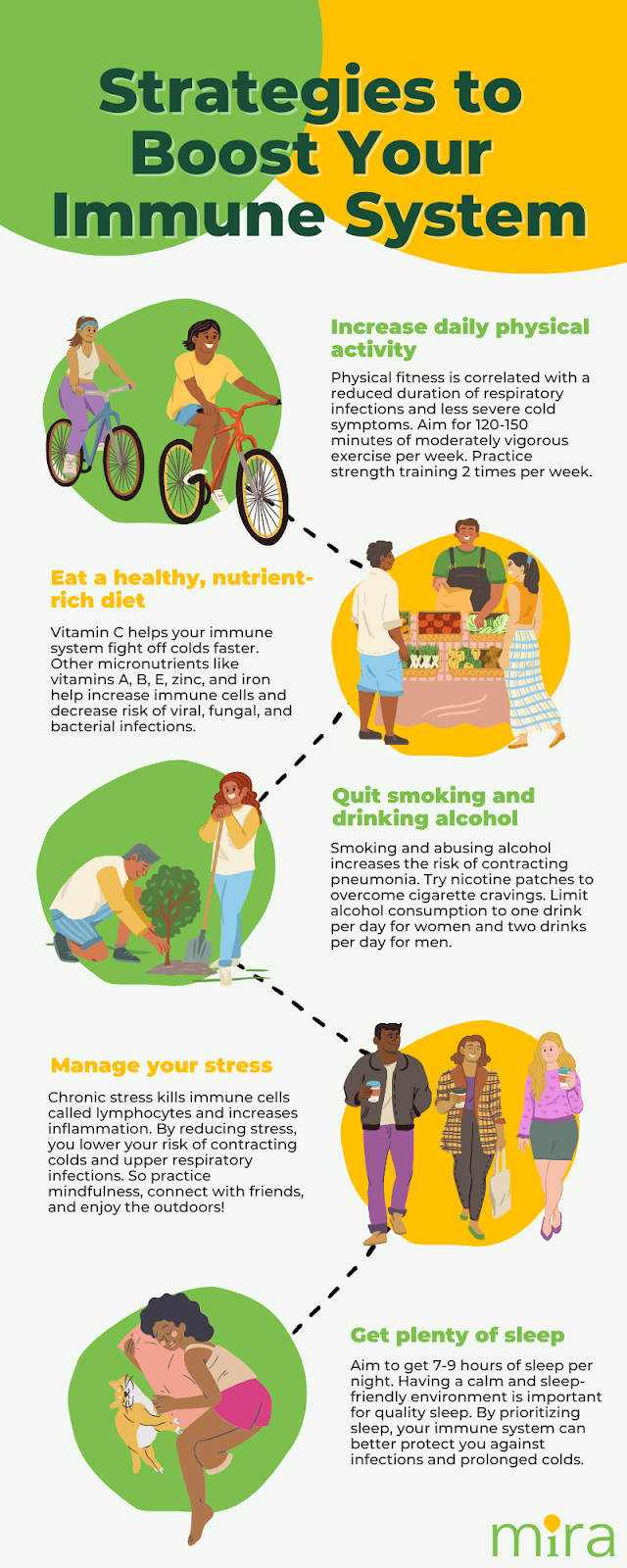How to Boost My Immune System - Updated 2024
Your immune system protects your body against infection and disease, fighting everything from flu viruses to cancer. Maintaining a strong immune system is critical for overall health and well-being. This article will walk you through five strategies to boost your immune system at home:
- Get plenty of sleep
- Eat a healthy diet
- Manage stress
- Exercise regularly
- Avoid smoking and drinking alcohol

Get Enough Sleep
The CDC recommends that adults sleep around 7-9 hours every night. People who get under 6 hours of sleep per night are almost 3 times more likely to catch a cold than those who sleep 8 or more hours. Quality of sleep is essential. People with less efficient rest were 5.5 times more likely to catch a cold than those with better quality sleep.
Sleep deprivation can put your body in a chronic inflammatory state, leading to fatigue, fever, and joint pain. Besides simple colds, these can exacerbate serious cardiometabolic, cancerous, autoimmune, and neurodegenerative diseases.
How Can I Get Better Sleep?
Getting good sleep can be challenging in our modern age of smartphones, work demands, and social demands. Here are some tips to improve the quality and duration of sleep:
- Consistency – Sleep and wake up around the same time every night and morning, even on weekends. Ask your friends and family to keep you accountable.
- Sleep-friendly environment – Ensure your bedroom is quiet, dark, and comfortable. Remove all electronic devices, including TVs, computers, and smartphones.
- Avoid heavy foods before bed – Before going to sleep, do not eat heavy meals, consume alcohol, or consume caffeine.
- Exercise – Be physically active during the day to fall asleep faster at night.
Eat a Healthy Diet
Eating a well-balanced diet rich in vitamins, minerals, antioxidants, and other essential nutrients is crucial for supporting immune function. Undernutrition and malnutrition can impair immune system function, making fighting off infections like colds or flu viruses difficult. The duration of colds is reduced by 8% among adults who ingest vitamin C regularly. Among children, 1 to 2g of vitamin C per day shortened the duration of colds by 18%.
Some key micronutrients essential for immune system function are outlined in the table below.
| Micronutrient | Immune System Function |
| Iron | Decreases the susceptibility to respiratory tract infections and pneumonia
Increases the number of immune cells (lymphocytes) |
| Vitamin A | Helps keep the skin and tissues of the mouth, stomach, intestines, and respiratory system healthy and safe from infections |
| Vitamin B-12 and B-6 | Helps intestinal health by strengthening the gut barrier
Increases the specific immune cells (lymphocytes) and red blood cells, which keeps the immune system oxygenated and supports cardiovascular health |
| Vitamin C | Helps form antibodies and healthy white blood cells that protect the body from harmful pathogens |
| Vitamin D | Regulates antimicrobial proteins that kill pathogens |
| Vitamin E | An antioxidant that protects cell membranes from damage caused by free radicals |
| Zinc | Helps heal wounds faster and supports an efficient immune response
Can shown to shorten the duration of the common cold and decrease the prevalence of pneumonia |
| Copper | Has antimicrobial properties that help immune cells fight off fungal disease and help increase lymphocytes |
| Selenium | Decreases risk of viral infections by increasing immune cell activity |
Sources: Mayo Clinic, BMJ
How Can I Maintain a Healthy Diet?
Diet cannot cure illness but can aid your immune system in recovering quickly. Eating three balanced meals every day is critical. Here is a list of foods that boost your immune system by providing necessary daily micronutrients:
- Fatty fish are rich in healthy fats, vitamins D and B, iron, and zinc.
- Albacore tuna
- Herring
- Mackerel
- Salmon
- Trout
- Sardines
- Citrus fruits are rich in vitamin C.
- Oranges
- Lemons
- Limes
- Grapefruits
- Bell peppers (though not a citrus fruit, they contain more vitamin C than an orange!)
- Green leafy vegetables are rich in vitamins A, C, and E.
- Broccoli
- Spinach
- Kale
- Chard
- Collard greens
- Arugula
- Bok Choy
- Yogurt contains probiotics that keep your gut healthy.
- Snacks like almonds and sunflower seeds are rich in vitamin E.
- Whole grain bread is high in fiber, which aids immune and digestive health.
Doctors often recommend eating a “Mediterranean diet,” which emphasizes eating fruits, vegetables, legumes, and whole grains, while avoiding processed foods, dairy, and red meat.

Get affordable doctor copay without paying insurance premiums
Join 39,000 people and get Mira, the best alternative to traditional insurance. Enroll and use immediately. Plans start at only $45/mo.
Jasiah Hasan is from Portland, Oregon. She is completing her Master's in Public Health in global health policy at George Washington University. Outside of health equity and women's health, Jasiah is passionate about writing and dreams of one-day publishing poetry books.
